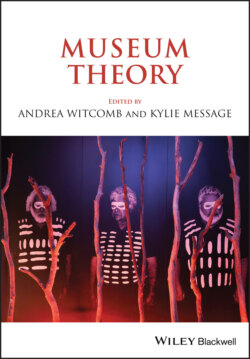Читать книгу Museum Theory - Группа авторов - Страница 22
Notes
Оглавление1 1 According to George Marcus (2006, 175), “the fascination with ethnography exhibited by disciplines and an interdisciplinary movement that are fundamentally text-oriented and rely on reading as a research practice derives from an anxiety about lack of connec-tion–empirical and experiential–with the social realities to which their analyses refer.”
2 2 For example, see American Association of Museums (1984); Mithlo (2004); Simpson (1996); Clifford (1997); Ames (2000); Kreps (2003); Peers and Brown (2003). Also see lii Introduction: Museum Theory policy documents which outline appropriate approaches for researchers, e.g., Museum Ethnographers Group (2003), and the guidelines and protocols relating to the 1990 Native American Graves Protection and Repatriation Act (NAGPRA) legislation (at http://www.nps.gov/nagpra/, accessed October 1, 2014).
3 3 Chen’s experience and scholarship were formed through participation in the Taiwanese democracy movement and analysis of cognate events such as the Korean June Democratic Uprising of 1987, the Tiananmen Square movement in China, and People’s Power in the Philippines. An interesting parallel can be drawn between Thomas and Chen on the grounds that in 2010, the same year Thomas published his thoughts on the “museum as method,” Chen published a high profile Duke University Press book called Asia as Method (2010).
4 4 The terms “ethnology,” “ethnography,” and “anthropology” have a long and complicated history which Howard Morphy summarized thus (email comm. to Witcomb, May 13, 2013): “In European anthropology ethnology was for a long time a synonym for anthropology as the study of living societies and their material worlds. Anthropology is a more encompassing term and included biological anthropology, archaeology, linguistics as well as social and cultural anthropology. In Britain the term anthropology tended to replace ethnology in the latter part of the 19th century. Ethnology almost ceased to be used except in the limited case of museum anthropology. In the USA ethnology began to separate itself off from cultural anthropology in some people’s minds because its focus was largely on the descriptive data of the societies being researched–collections of material culture became for a while more associated with the term ethnology than with social and cultural anthropology, reflecting a division that merged between anthropologists associated with the Bureau of American Ethnology (which primarily studied native American Societies) and Boassian anthropology. The continuing use of ethnology in Britain was almost limited to museum anthropology. It had the connotations of people who were still interested in material data, cultural data, objects as opposed to anthropologists who studied social relations. In Europe ethnology in its various language variants remained, until recently, the main terms for social and cultural anthropology. The term is now being replaced in general by anthropology. The term ethnography as in ethnographic museums and collections is easier to define! Ethnography basically refers to the data that anthropologists obtain through fieldwork. It encompasses fieldwork data, recordings, films, photographs and material culture collections.”
